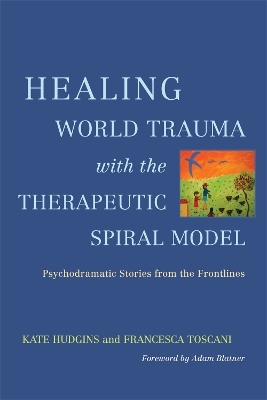
Healing World Trauma with the Therapeutic Spiral Model
Jessica Kingsley Publishers (Verlag)
978-1-84905-923-7 (ISBN)
The Therapeutic Spiral Model (TSM) was developed as a clinical method of addressing deep issues of trauma, notably post-traumatic stress disorder (PTSD) relating to physical and emotional abuse and addiction. A modified form of classical psychodrama and experiential psychotherapy, it is today used with survivors of many different forms of trauma in over twenty countries worldwide.
This book provides a succinct and accessible introduction to the Therapeutic Spiral Model in practice and its evolution, explaining how it works, its relationship with classical psychodrama, neurobiology, experiential psychotherapy and clinical psychology, and how it differs from other experiential therapeutic methods. For the first time, it describes the ways in which the TSM model has been used with diverse populations, and in different languages and cultures, in chapters contributed by experienced practitioners from the USA, the UK, Canada, Australia, South Africa and Taiwan. The original clinical applications of the TSM model are described, and detailed examples are given of its more recent applications, including its use with mothers affected by domestic violence, in work with traumatised families, with survivors of ethnic conflict and with men who are incarcerated.
Providing research-based theory and immediate, hands-on models of treatment for clinicians to use, this is a valuable resource for drama therapists, expressive arts therapists, counselors, community workers, peace builders and other psychology, social work and counselling professionals working with survivors of trauma.
Kate Hudgins, Ph.D., is a Clinical Psychologist, an International Master Trainer in Psychodrama, and primary developer of The Therapeutic Spiral Model. She directs the International Certification Program in Experiential Treatment of Post-Traumatic Stress Disorder, and has trained more than 800 psychologists, psychiatrists, counselors and educators to build Action Trauma Teams using the model. Kate continues to bring this healing method to global sites of trauma and conflict. Francesca Toscani, M.Ed., a certified Trainer in Psychodrama, Sociometry, and Group Psychotherapy and psychotherapist for thirty years, is co-developer of TSM. Combining her Jungian and psychodrama backgrounds, she developed Sandrama, a union of sandtray therapy with psychodramatic action. Francesca works part-time with small groups and individuals cultivating beauty and spirituality.
Foreword by Adam Blatner. Introduction. Section I: Therapeutic Spiral Model: Beginnings and Evolution. 1. A Life in Psychodrama. Zerka T. Moreno, Co-Founder of Psychodrama, Charlottesville, VA, USA. 2. The Similarities and Differences between Classical Psychodrama and The Therapeutic Spiral Model. Kate Hudgins, Ph.D., TEP, Therapeutic Spiral International, LLC, Charlottesville, VA and Francesca Toscani, M.Ed., TEP, Charlottesville, VA, USA. 3. The Evolution of the Therapeutic Spiral Model. Francesca Toscani, M.Ed., TEP, Charlottesville, VA and Kate Hudgins, Ph.D., TEP, Therapeutic Spiral International, LLC, USA. Section II: Theoretical Foundations and Research of the Therapeutic Spiral Model. 4. A Neuroscience Perspective on Trauma and Action Methods. Edward Hug, MSW, CP, Boston, MA, USA. 5. Anchoring The Therapeutic Spiral Model into Research on Experiential Psychotherapy. Leslie S. Greenberg, Ph.D., Professor, University of Toronto, Toronto, Canada. 6. Learning to be on the Action Healing Team in the Therapeutic Spiral Model: A Research Experience in Taiwan. Cho Wen Chun, Ph.D., Professor, National Kaoshiung Normal University, Kaoshiung, Taiwan, R.O.C. 7. The Therapeutic Alliance between the Protagonist and Auxiliaries. Charmaine McVea, Ph.D., Private Practice, Brisbane, Australia. Section III: Original Clinical Applications of the Therapeutic Spiral Model. 8. Healing Your Body: The Therapeutic Spiral Model with Eating Disorders. Colleen Baratka, MA, RDT, TEP, Catharsis Institute and Renfrew Center for Eating Disorders, Philadelphia, PA, USA. 9. Learning to Remember: Applications of the Therapeutic Spiral with Addictions. Mary Ann (Mimi) Hughes Cox, LCSW, TEP, Private Practice, Richmond, VA, USA. 10. Psychodrama and the Therapeutic Spiral Model in Individual Therapy. Karen Drucker, Psy.D., TEP, Private Practice, Adjunct Faculty, Naropa Institute, Boulder, CO, USA. Section IV: New Clinical Applications of the Therapeutic Spiral Model. 11. A Workshop Using the Therapeutic Spiral Model and Art Therapy with Mothers and Children Affected by Domestic Violence in Taiwan. Nien-Hwa Lai, Ph.D., TEP, Associate Professor, National Taipei University of Education, Taipei, Taiwan, R.O.C. 12. Seeing the Wizard: The Therapeutic Spiral Model to Work with Traumatized Families. Chip Chimera, Dip PP, Dip AMS, CQSW, Dip ASS. Director of Children's Center, Family Therapy Institute, London, England, UK. 13. Therapeutic Spiral Model Perspective from South Africa—The Rainbow Nation. Viyan Alers, Ph.D., Director of Acting Thru Themleize ( NGO), Johannesburg, South Africa. Section V: The Therapeutic Spiral Model with Men. 14. The Application of the Therapeutic Spiral Model at The Men and Healing Project. Roy Salole, MBBS, DMJ (Clin.), CTA (ITAA), Monica Forst, M.Ed., ICADC, & Rick Goodwin, MSW, RSW, The Men and Healing Project, Ottawa, Canada. 15. Footsteps on the Moon: Using Therapeutic Spiral Model Concepts with Offenders Who Have Unresolved Trauma. Clark Baim, Dip PP, Senior Trainer, Birmingham Psychodrama Training Center, Birmingham, UK. 16. Two Programs: The Therapeutic Spiral Model in Domestic Violence Work with Perpetrators and Survivors. Karen Carnabucci, LCSW, TEP, Private Practice, Racine, WI and Kevin Fullin, M.D., Private Practice, Kenosha, WI, USA. Afterword. References. Index.
| Erscheint lt. Verlag | 15.12.2012 |
|---|---|
| Vorwort | Adam Blatner |
| Zusatzinfo | 13 black and white illustrations |
| Verlagsort | London |
| Sprache | englisch |
| Maße | 152 x 228 mm |
| Gewicht | 540 g |
| Themenwelt | Medizin / Pharmazie ► Medizinische Fachgebiete ► Psychiatrie / Psychotherapie |
| Medizin / Pharmazie ► Physiotherapie / Ergotherapie ► Ergotherapie | |
| ISBN-10 | 1-84905-923-3 / 1849059233 |
| ISBN-13 | 978-1-84905-923-7 / 9781849059237 |
| Zustand | Neuware |
| Haben Sie eine Frage zum Produkt? |
aus dem Bereich


